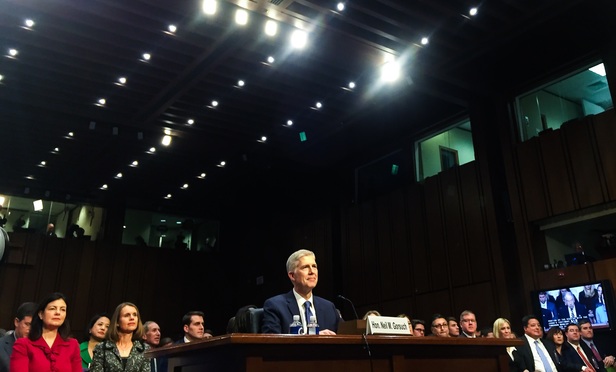 Judge Neil Gorsuch appears March 20 at his confirmation hearing. (Diego M. Radzinschi / ALM Media)
Judge Neil Gorsuch appears March 20 at his confirmation hearing. (Diego M. Radzinschi / ALM Media)
U.S. Supreme Court nominee Judge Neil Gorsuch emphasized in his opening statement Monday the independence and dedication to law of federal judges across the country.
“Judges are not politicians in robes,” Gorsuch, addressing the Senate Judiciary Committee, said Monday afternoon. “If I thought that I’d hang up my robe.”
Gorsuch didn’t mention President Donald Trump, whose criticism of the judiciary—through tweets and at rallies—drew rebuke from Republicans and Democrats alike. Democrats, leading up to the start of Monday’s hearing, had questioned whether and how Gorsuch would express his independence.
During his earlier visits with senators after his nomination, Gorsuch said he found personal criticism of judges “disheartening” and “demoralizing.” His comments followed Trump’s criticism of U.S. District Judge James Robart, who last month issued a temporary restraining order against the administration’s first immigration executive order.
Gorsuch, nominated to fill the vacancy created by the death of Justice Antonin Scalia, addressed the Senate committee in afternoon following opening statements by the committee’s 20 members.
Colorado Senators—Republican Cory Gardner and Democrat Michael Bennet—introduced Gorsuch. Hogan Lovells partner Neal Katyal, a self-described “part-time Colorado resident,” also was on the introductory panel. He described Gorsuch as a “rare intellect and a fair and decent man” who had two qualities necessary for the transition to justice: humility and ability, or “humibility.”
During his statement, Gorsuch spoke at length about his family and his roots in the west, as well as about his legal heroes. Those heroes, he said, were two justices for whom he clerked—justices Byron White, also a Coloradan, and Anthony Kennedy—and Scalia and Robert Jackson.
But he was particularly emphatic and direct when he turned to judges and judging.
“Our disagreements are not about politics but about the law’s demands,” Gorsuch said. Referring to the robes judges wear, Gorsuch said: “Ours is a judiciary of honest black polyester.”
He noted—and argued the detail would surprise some—that conservative Justice Clarence Thomas and liberal Justice Sonia Sotomayor agree about 60 percent of the time.
On his own court, the U.S. Court of Appeals for the Tenth Circuit, where he has served for ten years, the judges listen to each other, respect each other and apply the law, Gorsuch said. Of the 2,700 appeals that he has been involved in over a decade, he said, 97 percent were decided unanimously.
“And I’ve been in the majority 99 percent of the time,” he said. “That’s my record and how we do things in the west.”
His emphasis on that unanimity was in striking contract to the opening statement of Sen. Sheldon Whitehouse, D-Rhode Island, who recited a litany of 5-4 decisions by the Roberts Court that, he said, favored corporations.
The committee will return Tuesday morning to begin the first round of questioning of Gorsuch. On Thursday, the committee is scheduled to hear from supporters and opponents of the Gorsuch’s nomination. Committee chairman Charles Grassley, R-Iowa, said he intends to have the committee vote April 3.
Although the timing is tight, depending on when the nomination goes to the Senate floor, Gorsuch could be on the high court for the term’s final argument session in the last two weeks of April.
Related Articles:




